The Center for the Study of the Public Domain (at Duke Law), lists some of the better-known works that should have become public domain in the United States this year, except for the extension of copyright terms:

Current US law extends copyright for 70 years after the date of the author’s death, and corporate “works-for-hire” are copyrighted for 95 years after publication. But prior to the 1976 Copyright Act (which became effective in 1978), the maximum copyright term was 56 years — an initial term of 28 years, renewable for another 28 years. Under those laws, works published in 1958 would enter the public domain on January 1, 2015, where they would be “free as the air to common use.” Under current copyright law, we’ll have to wait until 2054. And no published works will enter our public domain until 2019. The laws in other countries are different — thousands of works are entering the public domain in Canada and the EU on January 1.
What books and plays would be entering the public domain if we had the pre-1978 copyright laws? You might recognize some of the titles below.
- Chinua Achebe, Things Fall Apart
- Hannah Arendt, The Human Condition
- Isaac Asimov (writing as Paul French), Lucky Starr and the Rings of Saturn
- Simone de Beauvoir, Mémoires d’une jeune fille rangée (Memoirs of a Dutiful Daughter)
- Michael Bond, A Bear Called Paddington, with illustrations by Peggy Fortnum
- Eugene Burdick and William Lederer, The Ugly American
- Truman Capote, Breakfast at Tiffany’s
- Agatha Christie, Ordeal by Innocence
- John Kenneth Galbraith, The Affluent Society
- Graham Greene, Our Man in Havana
- Dr. Martin Luther King, Jr., Stride Toward Freedom: The Montgomery Story
- Claude Lévi-Strauss, Anthropologie Structurale (Structural Anthropology)
- Mary Renault, The King Must Die
- Dr. Seuss, Yertle the Turtle and Other Stories
- T.H. White, The Once and Future King
What a trove of books — imagine these being freely available to students and educators around the world. You would be free to translate these books into other languages, create Braille or audio versions for visually impaired readers (if you think that publishers wouldn’t object to this, you would be wrong), or adapt them for theater or film. You could read them online or buy cheaper print editions, because others were free to republish them. (Empirical studies have shown that public domain books are less expensive, available in more editions and formats, and more likely to be in print — see here, here, and here.) Imagine a digital Library of Alexandria containing all of the world’s books from 1958 and earlier, where, thanks to technology, you can search, link, annotate, copy and paste. (Google Books has brought us closer to this reality, but for copyrighted books where there is no separate agreement with the copyright holder, it only shows three short snippets, not the whole book.) You could use these books in your own stories — The Once and Future King was free to draw upon Sir Thomas Malory’s Le Morte d’Arthur (a compilation of King Arthur legends) because Malory’s work was in the public domain. One tale inspires another. That is how the public domain feeds creativity. Instead of seeing these literary works enter the public domain in 2015, we will have to wait until 2054.



